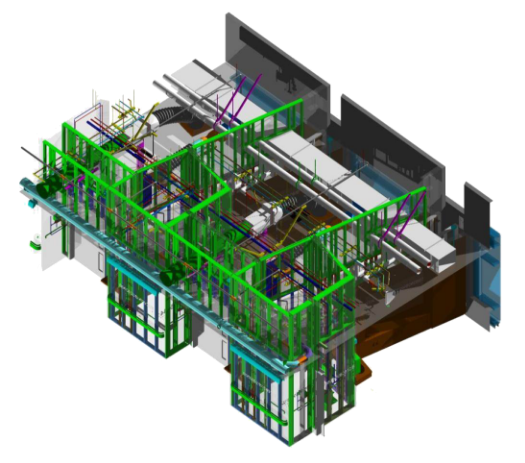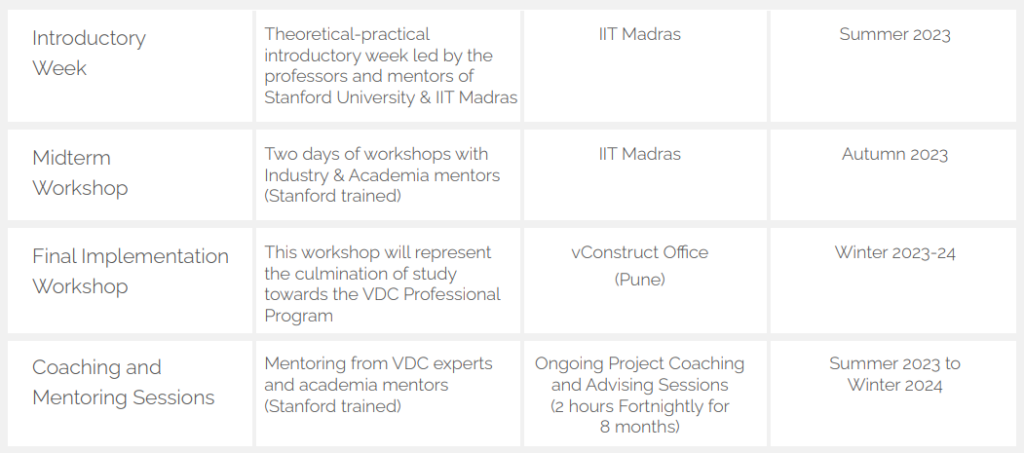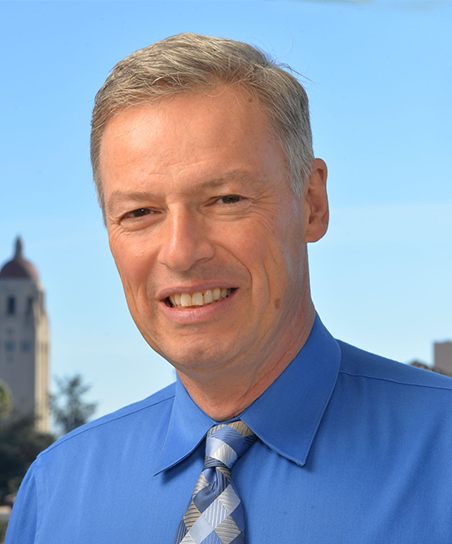
From where it all began, Stanford University faculty brings their customized VDC Program to India. Learn from the thought leaders how to build projects right the first time without rework and with predictable outcomes using VDC. With a track record of over 2000 certified professionals across the globe, this VDC Program is as much a community of construction technologists as it is a learning opportunity to maximize the ROI in VDC and technology for your organization.



Learn how to build an ecosystem of meaningful objectives and metrics, collaborative and integrated processes and digital twin creation, management and usage.
|
Introductory Week
|
Introduction of concepts with real world examples. Creation and review of VDC implementation plan. Lectures and interactive workshops led by Professor Martin Fischer from Stanford University and industry mentors.
|
IIT Madras
|
March 11 - 14, 2024
|
|---|---|---|---|
|
Midterm Workshop
|
Review of participants’ progress, revision of key concepts and focus on topics that need more attention. Led by Professor Martin Fischer and industry mentors.
|
Virtual
|
July 15 - 18, 2024 (3-4 workshop hours daily)
|
|
Integration Experience Workshop / Program Conclusion
|
Final report presentation and shared learning experience with all program participants led by Professor Martin Fischer from Stanford University and industry mentors.
|
IIT Bombay
|
Nov 25 - 26, 2024
|
|
Learn by doing: Application, Learning, Mentorship
|
Apply VDC methods on your projects or job function and report monthly on successes, failures, and learnings and receive feedback from peers and mentors.
Supported by online VDC training modules from the Stanford University. |
Virtual
|
March 17 - Nov 22 2024
|

In the introduction week participants will learn about what the VDC framework is: how to manage project information through visualization, information integration, and automation; how to set up and use project production process models; how to create impactful collaborations through integrated concurrent engineering; and how to align project production objectives with other objectives such as safety, quality, schedule, cost, and sustainability.
Each day of the introduction week includes an overview of the concepts, real-world examples and a workshop with feedback. At the end of the intro week, each participant will make their individual VDC implementation plan and will receive feedback on it.
In the following 7-month period, participants are expected to apply the VDC methods and report monthly on their successes, failures and learnings. In this period, they are supported by an online course from Stanford and by monthly check-ins with industry mentors and a group of peers. This learning-by-doing approach creates the competence and confidence needed for the participants to lead VDC implementations in their organizations following their certification.
A live-virtual midterm workshop will solidify the VDC concepts and focus on topics that need more attention and practice.
Finally, the program concludes with a 2-day integration experience where each participant’s final report is leveraged into another shared learning experience.
Salient Features of the VDC Program:
The Stanford Center for Professional Development has rolled out the VDC Program in India in collaboration with CTAI Foundation (Construction Technology Alliance Institute).
It has also delivered the program in Norway (in collaboration with the Norwegian University of Science and Technology, NTNU), Peru (in collaboration with the University of Lima), and in Switzerland (in collaboration with the Swiss University of Applied Sciences and Arts, FHNW).
In aggregate, these programs brought together over 2000 working professionals across the globe with varied industry experience and expertise and immersed them in VDC concepts and applications over a period of 8 months through both online and in-person education.
Directors, managers, and change leaders at owner/client, developer, architectural and engineering, project management consulting, general contractor, specialty contractor companies who aim to build projects right the first time without rework and with predictable outcomes with the use of VDC.

To get certified, you must participate actively and successfully in all the program elements, including project reports and submissions.
On successful completion of the program, you will be awarded certification from the Stanford Center for Professional Development.

Professor Fischer’s research goals are to improve the productivity of project teams involved in designing, building, and operating facilities and to enhance the sustainability of the built environment.
His work develops the theoretical foundations and applications for virtual design & construction (VDC).
VDC methods support the design of a facility and its delivery process and help reduce the costs and maximize the value over its life-cycle. His research has been used by many small and large industrial government organizations around the world.

All instructor-led sessions, coaching and mentoring sessions, online learning modules from the Stanford Center for
Professional Development.
Travel and lodging costs for in-person sessions.